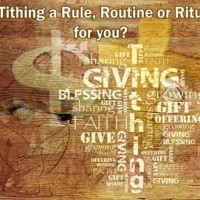

Read: Mark 7:1-8 |
Hypocritically, performing rote rituals, professing belief, calling oneself a member of a religion without attempting to follow the holy prescriptions, participating in church with a “social” country-club fervor – these can all be an evasion of our holy duty. They can be yet another form of idolatry whenever practicing the “religion” becomes its own end-point. [Laura Schlessinger, The Ten Commandments] We need to be wary of yielding to the temptation of turning our holy rituals into rote routines without meaning.
This week, we conclude the series “Is tithing a rule, routine or ritual?” by focusing on: “Is tithing a ritual?” You might remember, we defined a “ritual” as a routine with a meaning and purpose. Some studies have shown that the more rituals a family has, the fewer behavior problems there are among the children. Rituals such as family meals are linked to higher academic achievement. God established spiritual rituals such as baptism, the Lord’s Supper, marriage and stewardship. The rituals are God ordained and play a significant role in our lives by pointing us back to Him.
In our scripture, Mark records an encounter with the Pharisees (also see Matthew 15:1-20). They accuse Jesus of not following the Jewish ritual of hand washing before eating. Jesus pointed out that the problem with the ritual was that it was their ritual and not God’s! These religious leaders had added hundreds of religious rules and traditions to God’s laws over the centuries and made them equal to God’s law.
Jesus pointed out that the Pharisee’s made-up rules do not trump God’s laws. In fact, any ritual we follow or create should first be compared to and subordinated to the Bible. Secondarily, the ritual should help us remember the holiness of God or understand God’s laws better. We must keep in mind that a ritual becomes mere entertainment if the holiness is removed.
Thomas Merton, a writer in the 1950-60’s said, “Without love, giving an offering (almsgiving) is no more important an action than brushing our hair or washing our hands, and the Pharisees had just as elaborate a ritual for those things as they had for alms, too, because all these things were prescribed by law, and had to be done so. “But love does not give money; it gives itself. If it gives itself first and a lot of money too, that is all the better. But first it must sacrifice itself.”
While reflecting on his quote, let us wrap up our study of if Tithing or “Free-will Offering” is a Rule, Routine or a Ritual? I propose it is a:
Rule – God prescribed free-will rule that we can and should give of our free-will, out of love.
Routine – It is personal worship experience between God and the believer. God does not want us routinely, robotically and mindlessly following His precepts. We are to keep His heavenly intent intact as we follow Him and give of our time, talent and treasure
Ritual – It allows the corporate body of the Church to come together and worship Him on one accord. God has shown us that we need to separate the legalism of giving from the gift, so that we give out of love and not requirement.
As we prepare our tithe and offerings even now, let us always remember to treat this time reverently and recognize the holy purpose. Corporately giving our tithes and offerings is not entertainment, it is worship!
Outline:
Overview
Is Tithing a “Rule” for you?
Is Tithing a “Routine” for you?
Is Tithing a “Ritual” for you?
Questions:
1.Discover –
A. Do I approach any of God’s ordinances as a robotic ritual? If so, pray and seek to make sure you understand the meaning and significance of each ritual.
B. Did your parents institute any meaningful rituals about money that you have passed on to your family or have you started any with yours? Please share examples so others can learn and be inspired.
2.Develop –
A. What is your attitude and approach to the ritual of “offering time”? Is it a time in worship you look forward to or do you just robotically follow the process without thought?
B. What can you personally do to make the offering time more of a time of personal devotion?
3.Demonstrate –
A. In your family, when it comes to Stewardship, do you lead from the front by setting a good example or do you lead in words only by directing what should be done, but not always doing it yourself?
B. Has this study challenged or enhanced your understanding of the Old Testament and New Testament scriptures about Tithes and offerings? Has it changed your approach? Please share in the comment box below.

bayern m眉nchen trikot 2014
Many thanks a whole lot for sharing!
camiseta espa帽a 2014
Really appreciate you sharing this blog article. Much obliged.